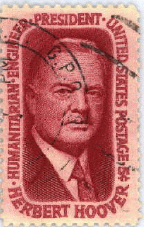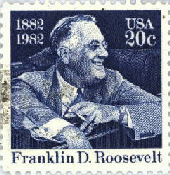Roosevelt Battles Depression
As the people rallied from the initial shock and began
seeking explanations, they noted unhealthy trends that had gone
unobserved beneath the prosperous facade of the 1920s. The core
of the problem had been the immense disparity between the country's
productive power and the American people's ability to
consume. Great innovations in productive techniques during and after
 the war
raised the output of American industry beyond the
purchasing capacity of American farmers and wage-earners. The
savings of the wealthy and middle classes, increasing far beyond
the possibilities of sound investment, had been drawn into frantic
speculation in stocks or real estate. The stock market collapse,
therefore, had been merely the first of several detonations in
which a flimsy structure of speculation had been leveled to the
ground.
the war
raised the output of American industry beyond the
purchasing capacity of American farmers and wage-earners. The
savings of the wealthy and middle classes, increasing far beyond
the possibilities of sound investment, had been drawn into frantic
speculation in stocks or real estate. The stock market collapse,
therefore, had been merely the first of several detonations in
which a flimsy structure of speculation had been leveled to the
ground.
The presidential campaign of 1932 was chiefly a debate over
the causes and possible remedies of the great depression. Herbert Hoover, unlucky in entering the White House
only eight months
before the stock market crash, had struggled tirelessly to set the
wheels of industry in motion again, but constrained by a
traditional conception of the federal government's proper role, he could
take no drastic action. His Democratic opponent, Franklin D.
Roosevelt, already popular as governor of New York state during
the developing crisis, argued that the depression stemmed from
 the American
economy's underlying flaws, which had been
aggravated by Republican policies during the 1920s. President Hoover
replied that the American economy was fundamentally sound but
had been shaken by the repercussions of a worldwide depression,
whose causes could be traced back to the world war. Behind this
argument lay a clear implication: Hoover preferred largely to
depend on natural processes of recovery, while Roosevelt was
prepared to use the federal government's authority for bold
experimental remedies. The election resulted in a smashing victory for
Roosevelt, who won 22,800,000 votes to Hoover's 15,700,000.
the American
economy's underlying flaws, which had been
aggravated by Republican policies during the 1920s. President Hoover
replied that the American economy was fundamentally sound but
had been shaken by the repercussions of a worldwide depression,
whose causes could be traced back to the world war. Behind this
argument lay a clear implication: Hoover preferred largely to
depend on natural processes of recovery, while Roosevelt was
prepared to use the federal government's authority for bold
experimental remedies. The election resulted in a smashing victory for
Roosevelt, who won 22,800,000 votes to Hoover's 15,700,000.
